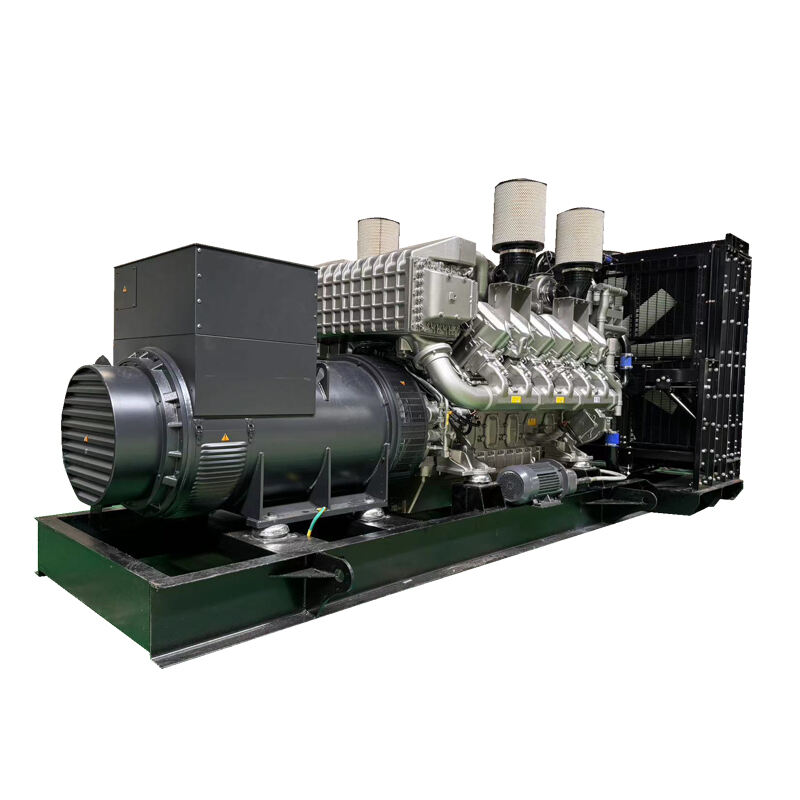What Are the Common Causes of Diesel Generator Failure and How Can They Be Prevented?
A diesel generator is one of the most reliable sources of backup and primary power in industries, residential buildings, healthcare facilities, data centers, construction sites, and off-grid locations. It provides dependable electricity when the main grid fails or when grid access is not available. However, despite their durability and reputation for reliability, diesel generators are not immune to problems. They can fail to start, shut down unexpectedly, or operate inefficiently if not properly managed.
Understanding the common causes of diesel generator failure and knowing how to prevent them is critical to ensuring continuous power supply, minimizing downtime, and extending the life of the equipment. This article explores the key reasons why a diesel generator may fail and provides practical strategies for prevention.
The Importance of Preventing Diesel Generator Failures
A diesel generator is often used in critical applications where power interruptions can have serious consequences. In hospitals, a generator failure could disrupt life-saving equipment. In data centers, it could result in data loss and service disruptions. For businesses, downtime translates into financial losses and reputational damage.
Preventing diesel generator failures is therefore not only about protecting equipment but also about safeguarding lives, business operations, and essential services.
Common Causes of Diesel Generator Failure
1. Fuel System Issues
Fuel-related problems are among the most frequent causes of diesel generator failure. These issues include:
Fuel Contamination: Diesel fuel can become contaminated with water, dirt, or microbial growth. Water enters through condensation in storage tanks, while bacteria and fungi thrive in warm, moist conditions, clogging filters and injectors.
Fuel Degradation: Diesel fuel degrades over time, forming sediments and varnishes that block fuel lines and reduce combustion efficiency.
Air in the Fuel System: Leaks in fuel lines or improper bleeding during maintenance can introduce air, preventing the generator from starting or running smoothly.
Prevention: To prevent fuel system problems, always use high-quality fuel, store diesel properly in clean tanks, and conduct regular fuel testing. Tanks should be cleaned periodically, and fuel stabilizers can be added to extend shelf life. Fuel filters should be checked and replaced regularly.
2. Battery Failure
A diesel generator relies on a battery for starting. Battery failure is one of the most common reasons for a generator failing to start. Causes include:
Low Charge: Batteries lose charge over time, especially if the generator is seldom used.
Sulfation: Lead sulfate crystals form on the battery plates when batteries remain discharged for long periods.
Corrosion: Terminals and cables may corrode, reducing conductivity.
Prevention: Batteries should be tested regularly for voltage and electrolyte levels. Keep terminals clean and corrosion-free, and recharge or replace batteries as needed. A battery maintenance schedule should be part of routine generator upkeep.
3. Cooling System Failures
Overheating is a common cause of diesel generator shutdowns. Cooling system problems often result from:
Low Coolant Levels: Leaks, evaporation, or lack of maintenance can lead to insufficient coolant.
Blocked Radiators: Dirt, dust, or debris can obstruct airflow, reducing cooling efficiency.
Faulty Water Pumps or Thermostats: These components may fail, disrupting coolant circulation.
Prevention: Inspect coolant levels before operation, clean radiators regularly, and replace worn-out hoses, pumps, and thermostats. Use the manufacturer-recommended coolant mixture to ensure proper performance.

4. Lubrication Problems
A diesel generator requires proper lubrication to prevent friction, wear, and overheating. Failure to maintain oil levels and quality can lead to:
Low Oil Levels: Oil leaks or inadequate checks may result in insufficient lubrication.
Degraded Oil: Oil breaks down over time, especially in harsh operating conditions, losing its ability to protect engine components.
Clogged Oil Filters: Dirty oil or neglected filters restrict flow and starve the engine of lubrication.
Prevention: Regularly check oil levels and top up as needed. Replace oil and filters according to manufacturer recommendations. Use high-quality oils suited to the operating environment.
5. Electrical Component Failures
Diesel generators rely on electrical systems for operation, including control panels, sensors, wiring, and alternators. Common electrical failures include:
Loose or Corroded Connections: Poor connections interrupt current flow.
Sensor Failures: Faulty sensors may cause false alarms or prevent the generator from starting.
Alternator Issues: Worn brushes, bearings, or windings can reduce power output.
Prevention: Inspect wiring and terminals regularly for corrosion, wear, or looseness. Test sensors and replace faulty components immediately. Alternators should be checked during routine maintenance.
6. Overloading and Improper Sizing
A diesel generator that is too small for the load will overheat, consume excessive fuel, and wear out prematurely. Conversely, an oversized generator running at very low load can suffer from wet stacking, where unburned fuel builds up in the exhaust system. Both situations reduce efficiency and reliability.
Prevention: Conduct a load analysis before purchasing or installing a generator. Ensure the generator size matches the application, and avoid consistently running it at extreme low or high loads. Load management and parallel systems can improve efficiency.
7. Poor Maintenance Practices
Neglecting maintenance is a leading cause of diesel generator failure. Without routine checks and servicing, small problems can escalate into major breakdowns.
Prevention: Follow a strict preventive maintenance schedule that includes fuel, lubrication, cooling, and electrical systems. Keep detailed records of inspections, servicing, and repairs.
8. Environmental Factors
Diesel generators operating in harsh environments face additional risks:
Extreme Temperatures: Cold weather can make starting difficult, while high heat can cause overheating.
Dust and Debris: Dusty environments clog filters and radiators.
Moisture and Humidity: High moisture levels cause corrosion and fuel contamination.
Prevention: Install weather enclosures or house generators indoors where possible. Use heaters in cold climates and ensure proper ventilation in hot environments. Replace filters more frequently in dusty conditions.
9. Human Error
Operator mistakes can also lead to diesel generator failures. Examples include incorrect start-up and shutdown procedures, improper fueling, or ignoring warning indicators.
Prevention: Provide thorough training for all personnel responsible for operating generators. Use clear operating manuals, post quick-reference guides near control panels, and conduct regular refresher courses.
Preventive Strategies in Detail
To maximize the reliability of a diesel generator, preventive strategies should be comprehensive and proactive:
Scheduled Maintenance: Establish daily, weekly, monthly, and annual inspection routines.
Load Testing: Regularly conduct load bank tests to ensure the generator can handle expected demand.
Fuel Management: Implement a fuel quality monitoring program with regular sampling and treatment.
Remote Monitoring: Modern generators can be connected to remote monitoring systems to track performance and detect issues early.
Spare Parts Inventory: Keep essential spare parts such as filters, belts, and sensors in stock to reduce downtime during repairs.
The Role of Hybrid Systems in Reducing Failures
In many applications, diesel generators are paired with renewable energy systems such as solar or wind. These hybrid setups reduce runtime, fuel consumption, and wear on the generator, lowering the risk of failure. By sharing the load with renewable sources, the diesel generator is preserved for times of peak demand or emergencies.
Real-World Examples
Hospitals
Hospitals often perform routine testing and maintenance of their diesel generators to avoid failures during emergencies. However, cases of fuel contamination or battery failure have been reported when maintenance schedules were ignored, underscoring the importance of vigilance.
Data Centers
Data centers require uninterrupted power supply. Even a few seconds of downtime can be catastrophic. They often use multiple diesel generators in parallel and employ remote monitoring systems to ensure failures are detected before they escalate.
Remote Communities
In off-grid communities that depend entirely on diesel generators, failures due to poor maintenance and fuel contamination are common. Programs that train local technicians and establish preventive maintenance routines have significantly reduced these failures.
Future Outlook
With advancements in technology, modern diesel generators are equipped with sensors, monitoring systems, and automated controls that reduce the risk of failure. Predictive maintenance using AI and IoT integration is becoming more common, allowing operators to identify problems before they lead to breakdowns.
At the same time, there is a shift toward combining diesel generators with renewable energy systems. This not only reduces emissions but also extends the life of the generator by minimizing operating hours.
Conclusion
Diesel generators are reliable machines, but they are not infallible. Fuel system issues, battery failures, cooling and lubrication problems, electrical faults, improper sizing, poor maintenance, environmental conditions, and human error are among the most common causes of diesel generator failure.
Preventing these issues requires a comprehensive maintenance program, proper fuel management, operator training, and the adoption of modern monitoring technologies. By addressing potential problems proactively, operators can ensure diesel generators deliver dependable power in even the most critical applications.
In an increasingly energy-dependent world, taking steps to prevent diesel generator failures is not just good practice—it is essential for safety, continuity, and efficiency.
FAQ
What is the most common cause of diesel generator failure?
Fuel system issues, particularly contamination and degradation, are among the most frequent causes of diesel generator failure.
How often should a diesel generator be maintained?
Maintenance should follow a strict schedule, with daily, weekly, monthly, and annual inspections, depending on usage and manufacturer guidelines.
Can fuel contamination really stop a diesel generator from working?
Yes, contaminated fuel can clog filters and injectors, prevent combustion, and ultimately stop the generator from running.
How can battery problems in a diesel generator be prevented?
By testing batteries regularly, keeping terminals clean, and ensuring they are fully charged or replaced before they fail.
Is it possible to completely eliminate diesel generator failures?
While no system is 100% failure-proof, proactive maintenance, proper fuel management, and operator training can minimize failures to a very low level.
Table of Contents
- What Are the Common Causes of Diesel Generator Failure and How Can They Be Prevented?
- The Importance of Preventing Diesel Generator Failures
- Common Causes of Diesel Generator Failure
- Preventive Strategies in Detail
- The Role of Hybrid Systems in Reducing Failures
- Real-World Examples
- Future Outlook
- Conclusion
-
FAQ
- What is the most common cause of diesel generator failure?
- How often should a diesel generator be maintained?
- Can fuel contamination really stop a diesel generator from working?
- How can battery problems in a diesel generator be prevented?
- Is it possible to completely eliminate diesel generator failures?

